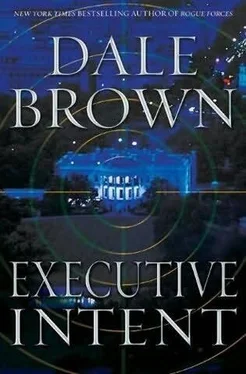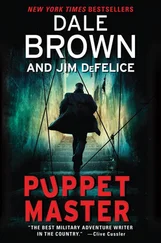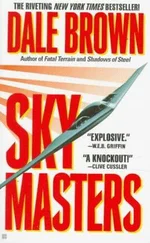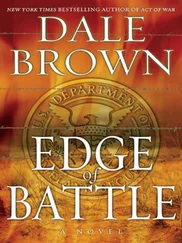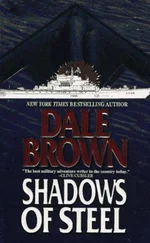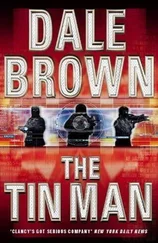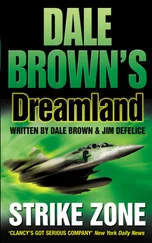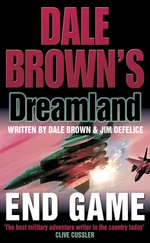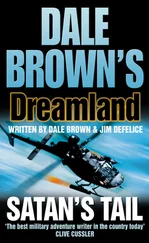“The Kamareeniy, or ‘Mosquito,’ sir,” Boomer said. He shuffled uncomfortably under his heavily bandaged right shoulder, but went on: “We first saw it about three years ago; it’s based on our ASM-135 ASAT from twenty-five years ago. The Russians didn’t make a big deal out of it until recently, like the Chinese and their Dong Feng-21s. Fairly mature technology, a lot cheaper than directed-energy antisatellite weapons like lasers or microwaves, and easier to move and conceal. It was supposedly one of General Andrei Darzov’s favorite programs when he was the Russian air force’s chief of staff-the guy is a space superfreak.”
“And now he’s the Russian military chief of staff,” Patrick said. “Truznyev is a powerful president, but Darzov may hold even more sway, especially in the military-soldiers never got along well with spies. I would guess that Darzov would never allow Truznyev to sign a treaty banning space weapons of any kind. Not exactly an opportune time to start talking about eliminating antisatellite weapons.” He looked at the vice president. “Rumor has it that you are going to head up the Space Policy Review panel, sir.”
“Keeping your ear on the rail once again, I see,” Phoenix said. “You always did have your own little spy network running, and I see it hasn’t retired.” He hesitated for a moment, considering whether or not to share the results of a confidential meeting in the White House with outsiders; then decided: “Yes, I was lobbying to head up an industry leaders’ commission on space technology, but it was morphed into redrafting space policy with the direct intent to prove to the rest of the world that the United States doesn’t see space as a sovereign national defense domain, and that we will cooperate with other nations for free access to space.”
“Seems to me we should keep the systems we have in place until we have a treaty ratified.”
“The president is afraid of losing all cooperation with China,” Phoenix explained. “He wants to use diplomacy to get back in their good graces and stop an arms race in space. The rest of the National Security Council is with him.”
Except Phoenix, Patrick noted silently.
The vice president looked out the window, obviously wrestling with a tough dilemma. “I think there’s a connection between the president leaking the formation of the National Space Policy review panel and the invasion of Somalia,” he said finally. “ China feels this is their opportunity, and they’re taking advantage. But there aren’t enough pieces here yet to show the picture.” He looked at each of the others in the limousine with him. “Space is suddenly becoming a very big deal, lady and gentlemen. I hope the president sees it before we lose our edge. I need to know what happened to that weapon garage, Patrick.”
“Unfortunately, the rumor is that Secretary Banderas is going to choose someone else to head the accident investigation board,” Ann Page said.
“Yeah, I heard, too,” Phoenix said. “General Walter Wollensky, former commander of U.S. Space Command.”
“It was not Secretary Banderas’s choice,” Ann said. “Wollensky is a good guy, but he was retired after the American Holocaust because of depression-the guy lost eight thousand airmen from his command in the attacks. He got his security clearance back and was working as a consultant for some aerospace firms. He was never a fan of Armstrong Space Station or the whole U.S. Space Defense Force concept.”
“So you think he’s going to help the president kill the Kingfishers?” Phoenix asked.
Ann shrugged. “I don’t know, sir, but I wish we had a better advocate for the program on that board.”
“You’re going to have to find the answer yourselves,” Phoenix said. “Cooperate with Wollensky, but challenge his conclusions with hard evidence.”
The limousine approached the hotel at which the vice president was staying; a small crowd of onlookers and party officials were waiting for him. “More campaign stops, sir?” Patrick asked.
“Yes.” Phoenix looked weary and a little downcast. “After attending a memorial service, it’s hard sometimes to gear yourself up to do campaigning, be cheerful and upbeat, and say good things about the future.”
“Especially when it’s not necessarily your future, sir?” Patrick asked in a low voice.
Phoenix half turned toward him, but his face was absolutely expressionless. He said tonelessly, “A car will take you back to San Jose. Thank you for meeting with me on the ride over, everyone,” and then shook hands with each of them.
“Good luck, Mr. Vice President,” Patrick said.
“I’ll be in touch, Patrick. Good to see you again.” The motorcade stopped, and at that, as if someone had thrown an invisible power switch, the vice president’s shoulders straightened, a beaming smile emerged, his chin lifted, his eyes twinkled, and suddenly he was in full-blown campaign mode. He was already greeting party officials, dignitaries, and reporters, most of them by name, before he had stepped outside the opened door.
Patrick, Ann, Boomer, and Kai had to listen to several minutes of cheering, questions shouted at the vice president by the reporters arrayed outside, and his campaign-ready answers delivered enthusiastically and sincerely, but soon the motorcade was on the move again. The vice president’s car separated from the others in the detail and went to an area behind the hotel where several unmarked cars, police vehicles, and even an ambulance were prepositioned in case of any threats against the vice president. They transferred to a standard limousine, which drove off toward San Jose International Airport.
They dropped Ann Page off first at her airline ticket counter, then headed around the field to the general aviation area to drop off Patrick. “Did you get the files I sent, General?” Kai asked after Ann had left the car.
“Yes, and Dave Luger and I have been going over them,” Patrick said. “But it’s all on the Kingfisher satellite. I’d like to see a dump of all your sensor data for at least two hours preceding the explosion.”
“Why?”
“Two reasons: I know you guys will be closely examining the Kingfisher, and I don’t really understand it that well anyway; and…well, other than that, I don’t know, except I have a hunch,” Patrick explained. “I don’t believe in coincidences. We’ve got antisatellite weapons flying everywhere; we’ve got China firing missiles, sending troops all over the place, and invading other countries; and in the middle of all that, a very reliable piece of hardware blows up for no apparent reason right after repairs are done.”
“You think China had something to do with Kingfisher-Eight?”
“We won’t know until we see what your sensors saw. Remember anything that happened around that time?”
“We were pretty busy-everything seemed to happen all at once,” Kai admitted, his brow furrowing as he tried hard to remember clearly. “The convoy missing, then discovered heading toward Mogadishu; the Chinese bomber formations we spotted; launching the Stud on short notice to link up with Eight; the repairs; the accident. No, I can’t think of anything else.”
The car pulled into the general aviation terminal and was allowed onto the parking ramp, where a dozen or so bizjets were lined up. Patrick retrieved his luggage from the trunk. “Well, if you think of anything,” he told Kai, “call me anytime.”
“Will do, sir.” He nodded toward the impressive line of jets. “Which one is yours?”
“Not there-over down that way,” Patrick said, motioning way across the ramp to an adjacent parking area. “They don’t park me with the heavy iron, and that’s the way I like it. The blue-and-white twin.”
Kai followed Patrick’s motion and saw a rather small twin-engine propeller plane, sitting by itself along with other smaller planes. “That’s it? The little bug-smasher?”
Читать дальше
